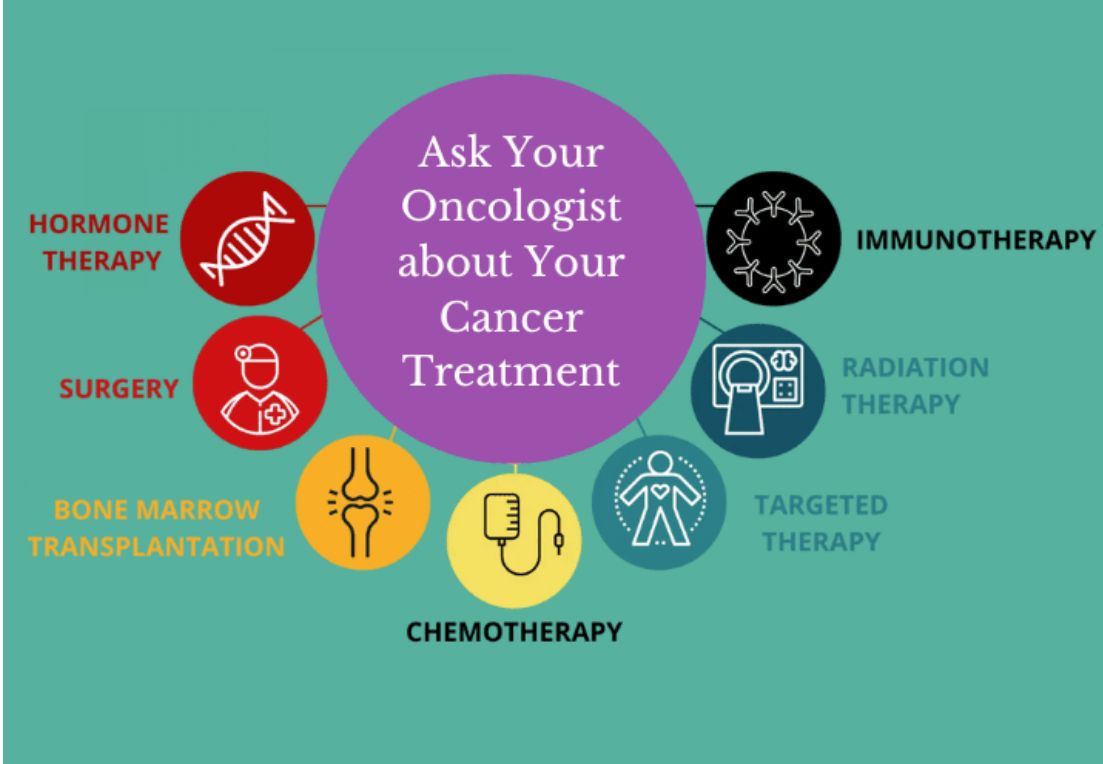🩺 Treatment Options for Cancer: An Overview for Patients and Caregivers
A diagnosis of cancer can feel overwhelming – but the good news is that treatment options today are more effective, personalized, and hopeful than ever before.
The choice of treatment depends on various factors such as the type of cancer, its stage, location, overall health of the patient, and personal preferences. In most cases, a multidisciplinary approach is used – combining different modalities to get the best possible outcome.
Here’s a clear overview of the main cancer treatment options available today.
🌟Surgery
What it is:
Surgical removal of the tumor or cancerous tissue from the body.
When it’s used:
- In early-stage cancers (like breast, colon, or oral cancers)
- When the tumor is localized and operable
- Sometimes to remove lymph nodes or assess spread
Goal:
To achieve complete removal of cancer (curative intent) or to relieve symptoms (palliative intent).
🌟Radiation Therapy
What it is:
Radiation therapy uses high-energy rays (like X-rays or proton beams) to destroy cancer cells.
When it’s used:
- As a primary treatment (e.g., prostate, head & neck, cervical cancers)
- Before surgery (to shrink the tumor)
- After surgery (to kill remaining microscopic cancer cells)
- For pain relief or symptom control in advanced cancers
Advanced techniques include:
- IMRT, IGRT (precise external beam radiation)
- Brachytherapy (internal radiation)
- SRS/SBRT (high-dose, focused treatments for brain/spine/lung/liver tumors)
🔬 Radiation therapy is non-invasive, painless, and delivered over a planned number of sessions under the care of a radiation oncologist.
🌟Chemotherapy
What it is:
Chemotherapy involves using powerful anti-cancer drugs to kill or slow the growth of cancer cells.
When it’s used:
- For cancers that have spread (metastatic)
- Before or after surgery/radiation
- In combination with radiation in certain cancers (e.g., cervical, head & neck)
Side effects:
Fatigue, nausea, hair loss, lower immunity – most of which are temporary and manageable.
🌟Immunotherapy
What it is:
A cutting-edge treatment that stimulates the body’s own immune system to recognize and attack cancer cells.
Used in:
- Melanoma, lung, kidney, bladder cancers
- Some head and neck cancers
⚠️ Not all cancers respond to immunotherapy – it requires molecular testing to determine suitability.
🌟Targeted Therapy
What it is:
Drugs that target specific molecules or genetic changes within cancer cells.
When it’s used:
- When genetic testing reveals actionable mutations (like HER2 in breast cancer or EGFR in lung cancer)
Advantage:
Less damage to normal cells compared to chemotherapy.
🌟Hormone Therapy
What it is:
Used to block or lower hormones that fuel certain cancers.
Effective in:
- Breast cancer (estrogen/progesterone-positive)
- Prostate cancer (testosterone-sensitive)
Usually combined with other treatments like surgery or radiation.
🌟Bone Marrow / Stem Cell Transplant
What it is:
Used primarily in blood cancers (like leukemia, lymphoma, multiple myeloma). It allows for high-dose chemotherapy followed by transplant of healthy stem cells.
🔁 Combination Therapy: The Multidisciplinary
Advantage
In many cases, the best outcomes come from combining two or more treatments. This is called multimodal therapy.
For example:
- Breast cancer: Surgery + Chemotherapy + Radiation
- Cervical cancer: Chemoradiation (Radiation + Chemotherapy)
- Lung cancer: Surgery + Targeted Therapy or Immunotherapy
A tumor board (a group of specialists including surgical, medical, and radiation oncologists) often collaborates to decide the most appropriate treatment plan.
💬 A Word from Dr Amrita Srivastava
“Every cancer is different, and so is every patient. My role as a Radiation Oncologist is to work closely with you and your care team to deliver a treatment plan that’s not only effective but also tailored to your life, your goals, and your comfort.”
📍 Final Thoughts
Choosing the right cancer treatment can be life-changing – and sometimes, life-saving. Understanding your options empowers you to make informed decisions with your care team.
If you or a loved one is navigating a cancer diagnosis and would like guidance on treatment options or a second opinion, feel free to reach out.
📞 Schedule a Consultation
👩⚕️ Dr. Amrita Srivastava
Radiation Oncologist | Navi Mumbai
🌐 www.dramritasrivastava.com
📞 +91 9136980810 | 📧 dramrita.oncology@gmail.com

